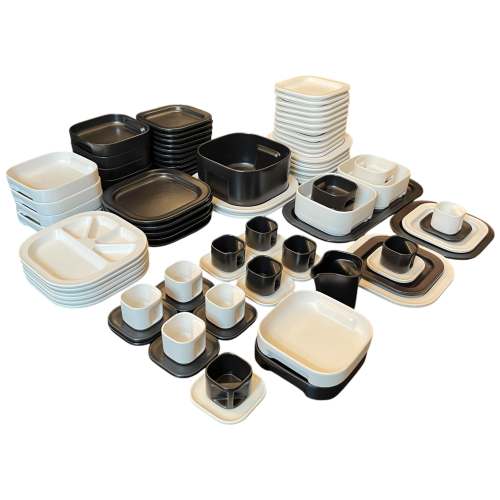MAKIO HASUIKE by LAVENO RAVELLI “Square” 88-piece, rare and iconic dinner & coffee service in glazed ceramic, ARNOLFO DI CAMBIO collection, Italian Design 1970s.
It is exceptional to find this service so complete, comprising 88 pieces !
Detailed composition:
• 6 black dinner plates, 25 × 25 cm
• 7 white dinner plates, 25 × 25 cm
• 12 black dinner plates, 20 × 20 cm (1 with a small chip, see photo)
• 12 white dinner plates, 20 × 20 cm
• 6 black deep plates, 19 × 19 cm
• 5 white deep plates, 19 × 19 cm
• 6 compartmentalized white fondue plates, 25 × 25 cm
• 2 white serving platters, 30 × 30 cm
• 1 large black rectangular platter, 50 × 25 cm
• 1 large black salad bowl, 24 × 24 × 8 cm
• 2 small white salad bowls, 19 × 19 × 8 cm
• 2 small black condiment dishes
• 2 small white condiment dishes
• 1 black milk jug or creamer
• 6 black cups (1 with a small chip, see photo)
• 6 black saucers
• 5 white cups (1 with a small chip, see photo)
• 6 white saucers
Artist / Designer:MAKIO HASUIKE (1938 - ).
- Issuer / Manufacturer:LAVENO RAVELLI.
- Stamp / Label:Yes.
- Period:20th Century / Mid Century / 1960 - 1980.
- Country of Origin:Italy.
- Dimensions (H x W x D):8cm x 30cm x 30cm.
- Weight:10 Kg.
- Number of components:88.
- Condition:Excellent.
- Style:Design / Minimalism.
- Material:Ceramic.
-
Price:SOLD
A bit of history:
Arnolfo di Cambio is an Italian company founded in 1960 in Tuscany, specializing in the production of design tableware and home objects. Known for its collaborations with renowned international designers, the brand quickly became a significant name in Italian design during the 1960s–1970s, combining artisanal craftsmanship with modern experimentation.
The “Square” service, produced in the 1970s by Laveno Ravelli for Arnolfo di Cambio and designed by Japanese designer Makio Hasuike, is an icon of table design from the period. Made in black and white glazed ceramic, it is distinguished by its square and rectangular geometric shapes, modularity, and the characteristic black/white contrast typical of Hasuike's minimalist aesthetic.
The service perfectly reflects the spirit of Italian design in the seventies: formal rigor, focus on functionality, and a sculptural approach to everyday objects.
Makio Hasuike was born in 1938 in Tokyo. He has lived and worked in Italy since the 1960s. In 1968, he founded his own design studio in Milan, Makio Hasuike & Co., which quickly became an international reference in industrial, graphic, and strategic design.
